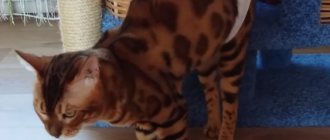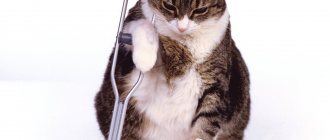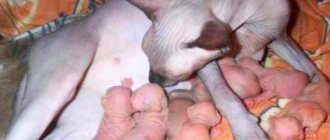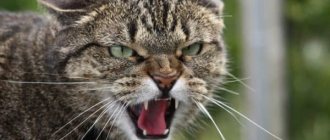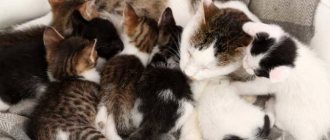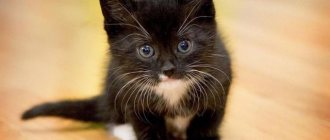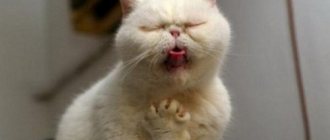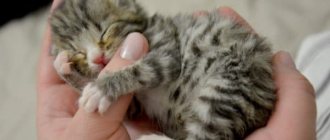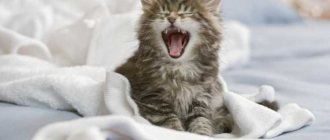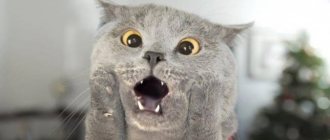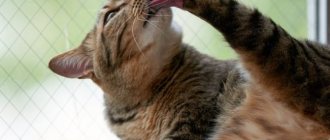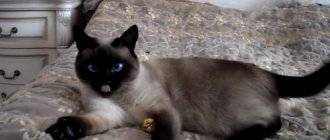Snoring is almost as common among cats as it is among people. Therefore, the characteristic sounds made by a pet during sleep are not always an alarming sign of serious pathologies. There are breeds that are predisposed to snoring due to the specific structure of the muzzle and olfactory organs in particular. There are cats that snore on their own, even though it doesn't happen that often. It is difficult to count all the reasons why a cat snores. In this article we will try to cover all aspects of cat snoring, its painful and healthy sides.
The cat snores
What is snoring from a physiological point of view?
In some cases, a cat snores due to obvious physiological factors, while other cases may indicate health problems. The domestic mustache is less predisposed to producing sounds in its sleep than dogs or people, so the owner should definitely listen to his pet.
Features of snoring in cats
Sniffling and snoring in furry cats is primarily associated with physiology. Relaxing your pet's entire body while resting causes his chest to shift slightly. This change causes difficulty breathing and wheezing sounds, which stop after changing body position.
Also, a kitten or an adult cat snores due to breed characteristics. This phenomenon sometimes occurs in individuals with modified faces. Whiskers with elongated or flattened heads are more susceptible to snoring than fluffies with a normal head shape.
Similar situations
Seals of any age can produce whistling and grunting melodies during the active resting phase, which lasts several minutes. Sometimes sniffling is accompanied by slurping, rumbling and even meowing - if the animal is having a stormy dream. However, this is not a common occurrence and usually brings a smile to the owner and his family. Peaceful snoring is considered a good sign - it means the fluffy feels calm and peaceful.
A bad sign is if the pet makes whistling-grunting sounds even when awake. Most likely, this is how he has health problems.
Normal cat condition
In exotic breed cats with a flat face, this process is the norm, due to the physiological feature of a short nose.
If your feline pet sniffles, but does not express any pain, his behavior has not changed, he plays, eats well, you need to examine the animal:
- if the nasal mucosa is pink, then the body receives enough oxygen;
- there is no discharge from the nose, which means a cold is excluded;
- Light pressure over the entire back will help determine whether there are or are no areas of pain.
Breathing with wheezing may be caused by a deviated nasal septum or obesity, which is not life-threatening.
When your cat sniffles, she also scratches her nose with her paws and sneezes; perhaps she just has an allergy, which will disappear after the allergen is eliminated.
Types of cat snoring
The sounds made during rest vary. They depend on the type of physiological disorders or breed characteristics. An experienced veterinarian will be able to diagnose the problem based on the nature of the sniffling, but it will be much more difficult for the owner.
Snoring in a pet can be of the following types:
- Dry
, similar to hissing. It can only be detected when air escapes or while listening with special instruments. This type indicates a narrowing of the trachea or problems with the bronchi.
- Wet
the type is also called bubbly - all because bubbles seem to roll and burst inside the sleeping fluffy. Symptoms are noticeable when inhaling and exhaling, even from a great distance.
- Crackling
a type that experts call crepitant. It is heard when you exhale and sounds like a cracking sound. This type provokes relaxation of the stuck together alveoli (pulmonary vesicles).
- Inspiratory
type, or stridor, similar to a characteristic hissing, whistling or just noise. A similar sound can be clearly heard when exhaling and inhaling. Stridor occurs due to narrowing of the upper airways.
The owner needs to listen to the sleeping pet and tell the veterinarian in detail about all the symptoms. Based on the characteristic features, the specialist will determine why the cat snores during the rest period.
Observing an animal - what to pay attention to?
Self-treatment of a pet is not recommended - it is advisable to seek the help of a veterinarian who will make an accurate diagnosis. It is recommended to carefully observe the pet for several days - this will help to accurately answer the veterinarian’s questions.
The following information will be helpful for your veterinarian's diagnosis:
- has the shade of the mucous membranes changed;
- how long does the snoring last, does it intensify during sleep, after eating;
- Are any extraneous sounds heard (wheezing, shortness of breath, increased breathing);
- whether the pet was injured.
Be sure to inform your veterinarian about any changes in your pet’s character and behavior. If the animal refuses to eat, prefers to sleep constantly, does not show activity or interest in games, also be sure to tell your veterinarian about this.
It is recommended to talk about additional signs that accompany sniffing. If your pet suffers from a runny nose, coughing attacks, or prolonged vomiting, also inform your veterinarian.
Is snoring dangerous for your pet?
An owner whose cat snores while resting should be careful. He should listen to the pet's sniffling and understand how often this happens.
If wheezing during inhalation and exhalation occurs rarely, then there is no reason for concern. However, constant uncharacteristic sounds at rest may indicate serious health problems with your mustachioed friend. Only a veterinarian can determine the cause of the symptom and help the pet. Sometimes delay in visiting a veterinary clinic and proper treatment leads to death.
What treatment can a veterinarian prescribe?
First, the veterinarian must conduct a complete examination of the cat, including the throat and nasopharynx. If the reason is not so obvious or it is necessary to clarify in more detail the extent of the damage, an x-ray will be prescribed. In some cases, a blood test will be required. In difficult cases, when special examination is required, the animal may be given anesthesia.
Once the reason why the cat snores in its sleep is determined, then treatment will be prescribed. These are pills and injections, IVs, diet. Sometimes it is necessary to use special ear swabs. They are used at the moment when the cat begins to fall asleep. In some cases, surgery will be required. Treatments and procedures must be supervised by a veterinarian.
Do not delay visiting a specialist if your cat begins to snore in its sleep. The health of a cat means the owner’s peace of mind, his good mood and joy for all family members, especially the little ones. Therefore, you need to take care of the well-being of your family first of all.
Source
Why does a cat snore and wheeze in his sleep?
There are a number of pathologies and non-dangerous reasons that explain why a cat snores in its sleep. These include diseases of the respiratory, cardiac, urinary systems, polyps, paralysis, breed characteristics and simply old age. The list can be long, so the owner will not be able to find out the reason on his own, without special education and experience.
Breed feature
Often hoarse inhalations and exhalations during rest occur due to peculiarities in the structure of the nasopharynx. There are pets that begin to snore in early childhood. This happens because the soft tissues of the larynx are not very elastic and air does not pass freely through the shortened nasopharynx. Among such representatives are:
- American Burmese;
- Persians, exotics;
- British, Scots;
- American shorthair cat;
- Devon Rex;
- Singapore.
The facial part of short-snouted individuals is flattened, and there is too much soft tissue for this skull shape. Because of this, a natural narrowing of the nostrils occurs. Therefore, the air leaves the respiratory tract with a strain. This symptom manifests itself not only during rest, but also in an alert state - and is considered the norm.
Elderly age
With age, all chronic diseases of the mustachioed friend become more acute, which leads to more frequent manifestation of their symptoms. Wheezing can be a symptom of diabetes or pneumonia that is dangerous to an older person's health. If wheezing occurs, the patient must be immediately shown to a doctor to also rule out heart failure in his four-legged friend.
In another case, an old cat snores simply because the tissues of its nasopharynx have worn out with age. This phenomenon is as normal as in older people.
Excess weight
Obesity is the cause of many pathologies that are dangerous to the health of your four-legged friend. Extra pounds make it difficult for a fat cat to function internally, and it is difficult to know whether cats snore due to an awkward positioning or illness. Consulting a specialist will help to cope with the problem - first of all, the doctor will advise the cat to lose weight.
Respiratory problems
Snoring made by a pet during relaxation is not an independent illness. The most common reasons that a cat snores in its sleep may be the following:
- Bronchitis
, inflammation of the lungs that occurs due to hypothermia. The pet should be treated urgently, and after the disease is eliminated, the characteristic wheezing will disappear.
- Injuries
which lead to concussion, broken ribs, and damage to internal organs. Lethargy, pain from touch, refusal to eat become signals for urgent consultation with a veterinarian.
- Foreign object
, if it gets into the throat, nasopharynx or esophagus, it interferes with the normal passage of air during inhalation and exhalation. Only urgent disposal of the foreign object will help the pet.
- Helminths
, which can spread throughout the body of a quadruped and even settle in the respiratory tract. They cause wheezing during inhalation and exhalation, snorting and coughing.
- Laryngeal edema
caused by allergies to food, pollen, medications, or strong odors.
Any of the presented ailments can be successfully treated under the supervision of a qualified specialist. The doctor diagnoses the disease and prescribes medications, diet or treatment procedures.
Diseases of the cardiovascular system
Problems in the functioning of the cardiovascular system are accompanied by specific symptoms: cardiac cough, bluish mucous membranes, wheezing when inhaling and exhaling. Sometimes hoarse sounds become the only manifestation of the disease. Therefore, obese or elderly cats are required to be checked for heart failure.
Unfortunately, sometimes this pathology is not noticeable. There are cases when an outwardly cheerful and completely healthy pet suddenly dies in its sleep. Problems with the cardiovascular system require proper treatment and constant attention from the person.
Other options
Sometimes pets simply see dreams in which they behave actively: chasing prey or escaping persecution. At such a moment, the fluffy can make different sounds and even move.
But if an animal has such dreams every night, it tosses and turns unhappily and constantly makes loud noises, then we are talking about overexcitation of the nervous system. This condition needs proper treatment.
